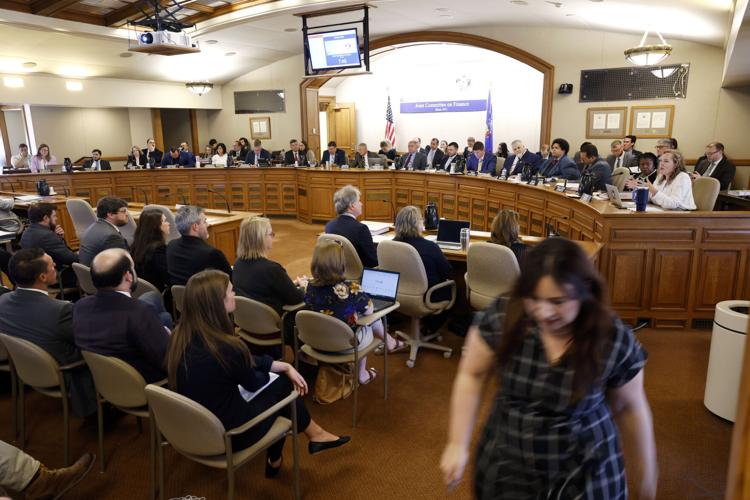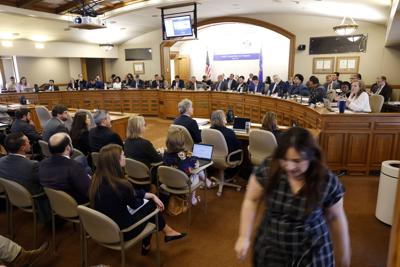MADISON — Area legislators had varying views about Wisconsin’s two-year budget plan, which received hurried votes in the state Senate and Assembly Wednesday and Thursday.
The $111 billion budget was approved by the Wisconsin Senate late Wednesday night. It then was passed by the Assembly just before 1 a.m. Thursday morning. Gov. Tony Evers signed the budget plan shortly afterward.
Evers signed the budget in the early morning hours Thursday to ensure the state gets a federal Medicaid match that it would lose under President Trump’s tax and spending cuts package.
State Sen. Mark Spreitzer, D-Beloit, voted no on the budget.
“While the budget the State Senate passed today was a significant improvement on the harmful path set by Republican legislators who threatened to slash funding for the Universities of Wisconsin, provide scant increases for K-12 schools, and end child care provider support entirely, it still falls short,” Spreitzer said in a news release. “Even with improvements, this is a budget that will allow the people of Wisconsin to survive when they need a budget that allows them to thrive.”
Spreitzer noted Evers and Senate Democrat Leader Diane Hesselbein secured $275 million more for K-12 special education costs, $330 million to support child care in Wisconsin, and $256 million to fund our Universities of Wisconsin.
“Without Senate Democrats, this budget would be a major step backwards for our state,” he said.
Other benefits Spreitzer pointed out in the budget include $150 million in new funding for the Agricultural Roads Improvement Program to help fix roads in rural areas, $50 million in new funding for the Grants for Local Projects program, $10 million for Food Security Grants for local food banks, and $30 million for comprehensive school mental health services.
“Despite these improvements, this budget still falls short of what our kids, our public schools, and our universities truly need,” Spreitzer said. “As I have travelled across my district, constituents have been crystal clear about what they want and need most from this budget, including fully funding Child Care Counts, raising the special education reimbursement rate to at least 60%, expanding Medicaid, funding the Knowles-Nelson Stewardship Program, and fully funding our schools at all levels — from K-12 to the Universities of Wisconsin.”
However, Assembly Majority Leader Rep. Tyler August, R-Walworth, said the budget is a victory for Wisconsin taxpayers. He said the bill continues to provide meaningful tax relief to Wisconsin residents and eliminates wasteful spending.
“The budget includes $1.5 billion in tax cuts and provides targeted relief to reduce tax burdens,” August said in a news release. “This agreement blocks more than $3.7 billion in proposed tax hikes, and thanks to Legislative Republicans, we continue to hold the line and protect your wallet from being forced to fund Governor Evers liberal wish list.
“Building on last session’s major conservative win of expanding School Choice, this budget extends Wisconsin’s successful school choice program to include four-year-old kindergarten, allowing families to access high-quality educational options at an earlier age. We also made significant investments in K-12 special education, some of the costliest services schools provide, by raising reimbursement rates to unprecedented levels,” August added. “Additionally, we reached an agreement to increase accountability within the UW System by requiring faculty workload reporting, performance measures, and continued caps on staffing.”
Sen. Steve Nass, R-Whitewater, who has a reputation as a fiscal conservative, said the budget was too heavy on spending.
“The Vos-Evers budget deal can only be described as on orgy of spending designed by two leaders that probably won’t be here to deal with the financial mess it will create in the 2027-29 biennium,” Nass said in a news release.
“Speaker Vos and Governor Evers agreed to a 15% increase in spending over the biennium. The proposed All Funds spending will be $114.3 billion. Remember the $4.3 billion one-time surplus that many legislators promised to return to taxpayers. Oops, those same legislators spent nearly all of that one-time money on ear-marks in their districts and funding for special interests,” Nass added.
Rep. Clinton Anderson, D-Beloit also rejected the budget proposal.
“K-12 schools, child care providers, hospital operators, transit systems, and the UW system have been asked to do more with less for far too long,” Anderson said in a news release. “I am sincerely grateful that Senate Democrats were at the table to negotiate big wins in some areas, but this budget is just not doing enough to set us up for long term success.
“Republicans today passed a budget that amounts to a broad property tax increase across Wisconsin,” Anderson added. “I introduced an amendment that would incentivize property tax freezes for counties and municipalities, but that amendment was rejected. Instead of providing this critical support, this body has forced our communities into a vicious cycle of raising their own taxes.”
Rep. Ann Roe, D-Janesville, said the rushed process did not help in meaningful dialogue and negotiations among lawmakers. She said she and fellow Democrats submitted 24 amendments to the budget bill and Republicans rejected all 24 amendments.
“As my colleagues noted, budget building should take place in a thoughtful, common-sense atmosphere, not a pressure-cooker,” Roe said in a news release.
“Due to the rushed process, most of Wisconsinites’ priorities are not addressed. Though some aspects of the State Budget have wins, this dollar amount will only keep the UW System’s lights on and keep campuses open. Democrats are continuing to fight to protect students, educators, and campuses to ensure that higher education remains accessible to all Wisconsinites, but this small increase is kicking the can down the road,” Roe added.
The Associated Press contributed to this story.


















